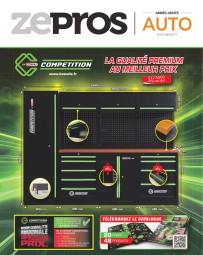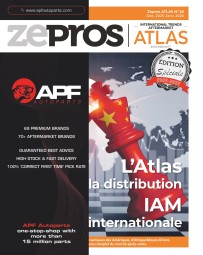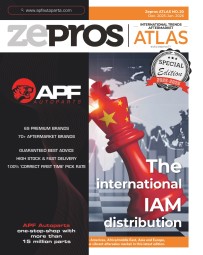
Europe: a second wave of consolidation coming?

While already well underway in Western Europe, distributor concentration is still as yet in its infancy on the Old Continent. Not only is there likely to be a second wave of consolidation in the most ’mature’ markets, but it is also likely to begin in many others…
Europe saw its first wave of consolidation concentrated between 2011 and 2018, during which the distribution ’majors’ – LKQ, AAG, PHE – built themselves up through acquisitions. The sector as a whole then had to cope with a global health crisis, followed by a chaotic industrial recovery exacerbated by a components crisis. Early 2022 saw an initial return to cruise speed and pre-Covid-19 business, with eight major transactions... before the outbreak of the Russian-Ukrainian conflict, which disrupted the world economy and generated galloping inflation.
2023 on hold
As a result, there have been few major takeovers to speak of in recent months. The first of these was the sale of GSF Car Parts, the UK’s No. 3 car parts retailer, which had to be sold by LKQ, the new owner of Quebec-based Uni-Select, which owned GSF. With 248 outlets and two distribution sites held via Euro Car Parts, LKQ - along with GSF and its 179 shops and two logistics sites - had attracted the attention of the UK competition authorities… Another major transaction in the 2023 financial year: the acquisition of Spain’s Gaudi by Alliance Automotive Group. After acquiring Lausan and its turnover of more than €110 million in 2022, AAG thus becomes one of the country’s leaders with the Iberian distributor’s 22 outlets and turnover of almost €100 million. The latest transaction was the sale by the EQT investment fund of its shares on the board of Kfzteile24, Germany’s leading online parts retailer. This paucity of transactions can mainly be put down to the financial turmoil generated by the current geopolitical environment. As Hugues Archambault, founding partner of The Bridge Corporate Finance, points out, “Money is more expensive, which has sharply reduced the competitiveness of financial investors, half of whose packages on average are based on debt; and for professionals in the sector, even if the rise in their financing costs has had a lesser impact, they have become more selective ”.
A new cycle, both unavoidable…
The European parts market is therefore still highly fragmented: the proportion of the IAM market held by the Top 3 distributors does not exceed 25%. At present, the only countries in which the market is significantly concentrated are Germany, France and, to a lesser extent, the UK: countries in which the Top 3 distributors account for 69%, 61% and 44% respectively of the independent aftermarket! Poland is a special case: with a fleet of 25 million light vehicles, almost half of the IAM market is held by its top three players. Starting with its domestic champion, Inter Cars, which alone is worth €3.3 billion, and has relied solely on organic growth. Exclusively integrated, Inter Cars has the honour of being in third position in the European distributor table. “ The second wave is likely to be more scattered, with acquisitions of medium-sized companies in the most mature markets ”, notes Hugues Archambault. Regarding the other countries, there is still a lot of potential, starting with the biggest markets like Spain and Italy (65 million cars between them). Although consolidation in these countries is starting (AAG and PHE are starting to battle it out in Spain, while Rhiag owner LKQ and Autodistribution Italia are competing with each other in Italy), the majors account for less than 20% of the market there.
… and multifaceted
So the question is no longer whether a second wave of consolidation is coming, but when. And how: distribution groups are no longer the only potential buyers. The IAM is of interest to at least one manufacturer, Stellantis, which is rolling out its Distrigo concept worldwide. Additionally, “ the group has a net cash position of more than €20 billion; and the American LKQ, the IAM leader in Europe, is valued at less than €15 billion ”, points out Hugues Archambault. As for the major new car distribution groups, they are already at work: Emil Frey (Flauraud, MGA and Barrault) and D’Ieteren are perfect examples. Sweden’s Hedin (with more than 330 dealerships in Europe) has also established a foothold in the IAM by buying out its compatriot OnWheels Bildemontering, a specialist in vehicle dismantling. Consolidation can also happen through specialists, as in the case of used parts: Sweden’s Autocirc, for example, is banking on external growth to become a European used parts champion, and now has more than 40 dismantling centres. There are still plenty of attractive potential acquisitions, such as the Swiss company SAG (€1 billion turnover), or the HGV specialist Europart, which is one of the Top 10 European distribution companies, with sales of €500 million. Generally speaking, another factor in favour of market consolidation in Europe is the age pyramid: “ Many of these companies are family businesses whose directors will not necessarily find successors within their own families or internally ”, concludes the founding partner of The Bridge Corporate Finance.








